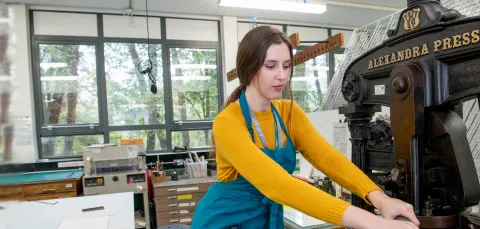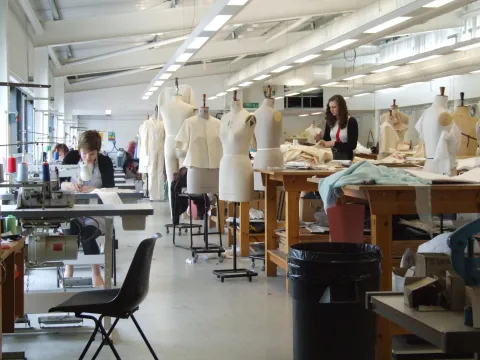About this course
The MA Textile Design programme is designed to push your creative boundaries and abilities. It will encourage you to develop a forward thinking approach to both individual and collaborative work through in-studio practices.
Through practical experience in the studio, you will have the opportunity to develop your advanced technical knowledge, including drawing abilities, design evolution, and proficiency in heritage techniques.
You’ll also develop skills in:
- trend and colour
- forecasting
- market awareness
- design layout
- display strategies
Through group and individual critiques, presentations and workshops, industry practitioners and experts in the field, you will foster a spirit of enquiry which meets a wide range of learning needs and styles.
Special features of the programme include:
- Live projects: meticulously constructed to immerse students in professional, "real-world" scenarios, the projects are set in collaboration with renowned designers affiliated with London Fashion Week and the British Fashion Council.
- Field trips: encompasses self-funded visits to prominent exhibitions, shows, design studios and production facilities across the UK and/or Europe.
- Industry events: opportunities to attend trade fairs through membership of UKFT and potentially participate in events such as London Fashion Week and Africa Fashion Week, along with others specific to our professional industry partners.
- Photoshoots and catwalk shows: as part of your programme, you will learn to style your outcomes, plan and execute photoshoots and/or catwalk shows, working alongside industry contributors, professional photographers, stylists, hair and make-up artists, in the creation of a Look Book.
- Collaborations: cross-programme, collaborative, student-led, co-curricular activity is organised annually to celebrate diversity, creativity, community and inclusive employability skills.
- Internship: students are encouraged and supported in identifying and preparing applications with the potential to secure and internship.
Our unique philosophy inspires creativity and freedom of expression, through research methodologies, contextual understanding and advanced design theory and practice. Central to our approach is the consideration of interdisciplinary collaborations essential to the future of professional teamwork, as well as materialities that include heritage techniques and ethical practices. You will enhance your awareness, knowledge and skills within the context of contemporary textile design.
We regularly review our courses to ensure and improve quality. This course may be revised as a result of this. Any revision will be balanced against the requirement that the student should receive the educational service expected. Find out why, when, and how we might make changes.
Our courses are regulated in England by the Office for Students (OfS).
Course lead
This MA textiles course leader is Reem Alasadi, who has presented her womenswear collections in London and Tokyo and specialises in highly innovative design, specialising in artisanship and hand-crafted excellence. She brings a wealth of knowledge and expertise in retail, design, visual marketing and merchandising to the course. She also has considerable expertise in sustainable and ethical design and has led many workshops in non-waste design.
Learn more about this subject area
Course location
This course is based at Winchester.
Awarding body
This qualification is awarded by the University of Southampton.
Download the Course Description Document
The Course Description Document details your course overview, your course structure and how your course is taught and assessed.
Entry requirements
You'll need a 2:2 degree or equivalent international qualification in a subject relevant to textile design.
As part of your application, you'll also be required to submit a a portfolio that shows your understanding and practice of contemporary and ethical textile design. You can read more about the components your portfolio should include in the 'How to apply' section.
English language requirements
If English isn't your first language, you'll need to complete an International English Language Testing System (IELTS) to demonstrate your competence in English. You'll need all of the following scores as a minimum:
IELTS score requirements
- overall score
- 6.5
- reading
- 6.0
- writing
- 6.0
- speaking
- 6.0
- listening
- 6.0
We accept other English language tests. Find out which English language tests we accept.
If you don’t meet the English language requirements, you can achieve the level you need by completing a pre-sessional English programme before you start your course.
Pre-masters
If you don’t meet the academic requirements, you can complete a pre-master's programme through our partnership with OnCampus. Learn more about the programmes available.
Got a question?
Please contact us if you're not sure you have the right experience or qualifications to get onto this course.
Email: enquiries@southampton.ac.uk
Tel: +44(0)23 8059 5000
Course structure
This one year course is full-time comprised of 3 semesters. You will study three compulsory modules during the programme.
In semester 1 you will research, explore and demonstrate your advanced design ability. Semester 2 you will engage in self-directed project planning leading to a pre-collection and working in The Company.
You will develop your final project in semester 3. Students are encouraged to develop an informed and creative approach to their textile practice.
Want more detail? See all the modules in the course.
Modules
The modules outlined provide examples of what you can expect to learn on this degree course based on recent academic teaching. As a research-led University, we undertake a continuous review of our course to ensure quality enhancement and to manage our resources. The precise modules available to you in future years may vary depending on staff availability and research interests, new topics of study, timetabling and student demand. Find out why, when and how we might make changes.
For entry in academic year 2025 to 2026
Year 1 modules
You must study the following modules :
Contextual Practice (Textile Design)
This compulsory module aims to deepen your understanding of historical and contemporary contexts relating to textile design. You will learn to critically reflect upon and analyse your work within a contextual framework through visual, verbal and written c...
Creative Experimentation: Pre-collection (Textile Design)
This module offers you the opportunity for further investigation, risk-taking and critical self-assessment as you develop and define your unique textile design identity. Working towards a pre-collection will allow you to examine new ideas and test innovat...
Final Major Project (Textile Design)
This is your final Masters module, in which you are required to identify, develop and present a unique and cohesive collection of contemporary design outcomes that capitalise on, and are demonstrative of, the Masters skills and experience you have accrued...
Introduction to Design Principles (Textile Design)
This compulsory module introduces you to enhanced textile design principles and encourages you to develop an innovative and exploratory perspective on your studio practice, through a combination of projects and technical workshops. This considered approac...
Professional Attributes: The Textile Industry
Within this compulsory module and in conjunction with your studio practice, you will begin to explore your unique design identity. You will be introduced to crucial entrepreneurial skills required for self-promotion and employability as a professional cre...
Professional Practice: The Company (Textile Design)
The Company is a cross-programme, collaborative and student-led initiative that celebrates creativity, inclusivity, diversity and community in live, real-world scenarios and which demonstrate relationships informed by expertise within and beyond the unive...
You must also choose from the following modules :
Experimental Publishing
The consideration of what publishing actual means today remains a relevant question for any creative practitioner. Over the past few years we have seen a huge rise in self-publishing, print on-demand services, tweeting and social media, from post-digital ...
Exploring the Visual Language of Display
The module provides thematic examples of the theories and practices of visual presentation and display explored through interdisciplinary and critical contexts appropriate to the MA pathways. It offers a number of critical “tools”, enhanced through refere...
Professional / Collaborative Projects
In this module, students gain first-hand experience of professional work in the arts. The module adopts a DIY ethos, which has been fundamental to the development of the visual arts in the UK, through artist collectives, collaborative studio provision and...
Visual Culture
We live in a world that is saturated by images, from the far reaches of space to the sub-atomic level and just about everything in between. Images seem to have a special power in our lives, playing a part in the constructions of who and what we are and t...
Learning and assessment
Learning
We take an individualised approach to teaching. Tutors are in the studio every week, working with students one-to-one and in groups, running workshops and discussions, and leading peer-to-peer feedback sessions.
You’ll learn through a combination of:
- lectures
- seminars
- tutorials and workshops
- studio practice and independent study
- essential workplace skills and industry opportunities
Guest lectures and visits to exhibitions and trade fairs in London will enrich your learning and give you new perspectives on your own work.
Assessment
We will assess you through:
- your portfolio and final project collection
- evidence of the research underpinning your studio practice
- reflective assignments that critically evaluate aspects of your own learning
- your approach to problem solving and team working
Dissertation
Throughout this course you will create a portfolio of work which will form the basis of your final project
You will need to create, and will be assessed, on an 800-word report that supports your portfolio. As part of the final project you'll also be required to create and present an 800-word exhibition of your work.
Academic Support
Winchester School of Art is a supportive, informal learning community in which students’ talents are nurtured. We are approachable and ready to answer questions about the course or offer hands-on help with practical work. Our technical team offer support with studio equipment and learning new techniques. In addition, every student has a personal academic tutor who can advise you on academic or personal matters.
Careers and employability
The employability and enterprise skills you'll gain from this course are reflected in the Southampton skills model. When you join us you'll be able to use our skills model to track, plan, and benefit your career development and progress.
Download skills overview

Work experience opportunities
Choosing to do work experience is a great way to enhance your employability, build valuable networks, and evidence your potential. Learn about the different work and industry experience options at Southampton.
Careers services and support
We are a top 20 UK university for employability (QS Graduate Employability Rankings 2022). Our Careers, Employability and Student Enterprise team will support you. This support includes:
- work experience schemes
- CV and interview skills and workshops
- networking events
- careers fairs attended by top employers
- a wealth of volunteering opportunities
- study abroad and summer school opportunities
We have a vibrant entrepreneurship culture and our dedicated start-up supporter, Futureworlds, is open to every student.
Your career ideas and graduate job opportunities may change while you're at university. So it is important to take time to regularly reflect on your goals, speak to people in industry and seek advice and up-to-date information from Careers, Employability and Student Enterprise professionals at the University.
Fees, costs and funding
Tuition fees
Fees for a year's study:
- UK students pay £9,250.
- EU and international students pay £27,800.
Deposit
If you're an international student on a full-time course, we'll ask you to pay £2,000 of your tuition fees in advance, as a deposit.
Your offer letter will tell you when this should be paid and provide full terms and conditions.
Find out about exemptions, refunds and how to pay your deposit on our tuition fees for overseas students page.
What your fees pay for
Your tuition fee covers the full cost of tuition and any exams. The fee you pay will remain the same each year from when you start studying this course. This includes if you suspend and return.
Find out how to pay your tuition fees.
Accommodation and living costs, such as travel and food, are not included in your tuition fees. There may also be extra costs for retake and professional exams.
Explore:
10% alumni discount
If you’re a graduate of the University of Southampton, you could be eligible for a 10% discount on your postgraduate tuition fees.
Postgraduate Master’s Loans (UK nationals only)
This can help with course fees and living costs while you study a postgraduate master's course. Find out if you're eligible.
Southampton Arts and Humanities Deans Global Talent Scholarship
Ten scholarships of £10,000 each are available to international students studying for an undergraduate degree or a postgraduate master’s degree in Arts and Humanities.
Find out more about the Southampton Arts and Humanities Deans Global Talent Scholarship, including eligibility, deadlines and how to apply.
Other postgraduate funding options
A variety of additional funding options may be available to help you pay for your master’s study. Both from the University and other organisations.
Funding for EU and international students
Find out about funding you could get as an international student.
How to apply
- Use the blue 'apply for this course' button on this page to take you to our postgraduate admissions system.
- Create an account which gives you access to your own application portal. .
- Search for the course you want to apply for.
- Complete the application form and upload any supporting documents.
- Pay the £50 application assessment fee, (there are some exemptions, check terms and conditions).
- Submit your application.
For further details of our admission process, read our step by step guide to postgraduate taught applications.
Application deadlines
There are different application deadlines for this course. Applications are expected to close:
- International students: Tuesday 29 July 2025, midday UK time
- UK students: Tuesday 9 September 2025, midday UK time
We advise applying early as applications may close before the expected deadline if places are filled.
Application assessment fee
We’ll ask you to pay a £50 application assessment fee if you’re applying for a postgraduate taught course.
This is an extra one-off charge which is separate to your tuition fees and is payable per application. It covers the work and time it takes us to assess your application. You’ll be prompted to pay when you submit your application which won’t progress until you've paid.
If you're a current or former University of Southampton student, or if you’re applying for certain scholarships, you will not need to pay the fee. PGCE applications through GOV.UK and Master of Research (MRes) degree applications are also exempt. Find out if you’re exempt on our terms and conditions page.
Supporting information
Portfolio guidance
Your portfolio is one of the most important parts of your application. It is your opportunity to show us your work, and it is our opportunity to find out more about you.
Your portfolio should be a clear, logical and professional presentation of your work, and contain a variety of your most recent and relevant projects.
It should include images of your final work, from sources such as exhibitions or photoshoots. It should also include evidence of the processes behind your final work, such as drawing and sketches. You should try to include observational drawings and Computer Aided Design (CAD) work.
Finally, you should provide examples of processes and techniques, such as:
- dyeing
- screen printing
- digital printing
- woven textiles
- special finishing techniques
We understand you may not be coming straight from an undergraduate course and we will accept older work in your portfolio. However, please include as much of your recent work as possible. We welcome and assess each application individually.
Personal statement
When you apply you’ll need to submit a personal statement explaining why you want to take the course.
You’ll need to include information about:
- your knowledge of the subject area
- why you want to study a postgraduate qualification in this course
- how you intend to use your qualification
References are not required for this programme.
Please include the required paperwork showing your first degree and your IELTS English language test score (if you are a non-native English speaker) with your application. Without these, your application may be delayed.
What happens after you apply
You'll be able to track your application through our online Applicant Record System.
We receive a high volume of applications for this course. This means you may not receive a response to your application for up to 12 weeks.
Unfortunately, due to number of applications we receive, we may not be able to give you specific feedback on your application if you are unsuccessful.
Equality and diversity
We treat and select everyone in line with our Equality and Diversity Statement.
Got a question?
Please contact us if you're not sure you have the right experience or qualifications to get onto this course.
Email: enquiries@southampton.ac.uk
Tel: +44(0)23 8059 5000
Related courses
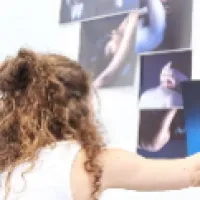
Arts and Cultural Leadership

Communication Design
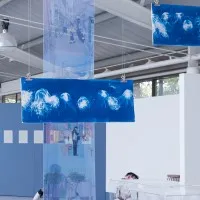
Contemporary Curating

Creative Technologies

Design Management
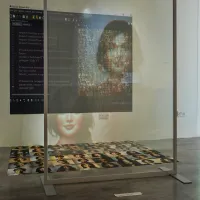
Digital Media Practices

Fashion Design

Fashion Management

Fashion Marketing and Branding

Fine Art

Global Advertising and Branding

Global Media Management

Luxury Brand Management

PGCE Art and Design


